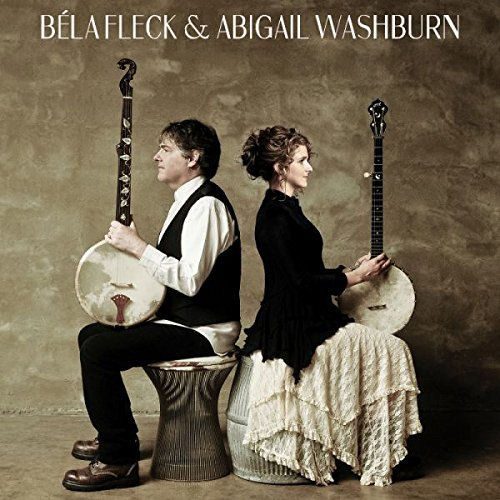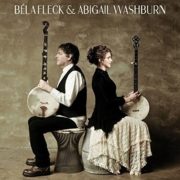BÉLA FLECK AND ABIGAIL WASHBURN AT CAP-UCLA
BÉLA FLECK AND ABIGAIL WASHBURN AT CAP-UCLA
In Concert At Royce Hall
Thursday, December 6, 2018 – 8:00pm
STRUMMING ON THE OLD BANJO
 “This machine surrounds hate and forces it to surrender” ~ on Pete Seeger’s banjo head
“This machine surrounds hate and forces it to surrender” ~ on Pete Seeger’s banjo head
The last time I heard a banjo played at Royce Hall, Earl Scruggs was giving his farewell concert. I was thrilled to be able to hear him, and to review his performance. So it’s no accident I am here to enjoy his greatest successor Béla Fleck, who now performs with his wife and fellow banjo player Abigail Washburn. She plays old-time clawhammer style against his sumptuous Bluegrass plus many original redefinitions of Scruggs’ style three-finger picking. Together they demonstrate in song after song the Darwinian evolution of banjo playing from its first appearance in the Appalachian mountains as inherited from African slaves.
Their ancestors and descendants brought it over in the dark holds of Southern merchant ships—the kind Bob Marley conjured up in Redemption Song
Old pirates yes they rob I
Sold I to the merchant ship
minutes after they took I
From the bottomless pit
—and the gourd heads covered tightly with dried and stretched thin coonskins and possum skins and strung with their guts gave way to the sophisticated complex rhythms and sparkling single-note progressions Scruggs invented for Bill Monroe and the Bluegrass Boys and, later on, his duo partner Lester Flatt.
Bela Fleck tells this fascinating American story in a documentary film Throw Down Your Heart, based on original research on the African continent, where he traveled years back with a Nashville sound engineer to record actual samples of the music first heard on primitive examples of the instruments that would become the early “banjar” played by both black and black-face minstrels in traveling minstrel shows of such groups as the Christy Minstrels, the most popular of the groups who performed and profited from the songs of Stephen Foster, Dan Emmett and others before the Civil War.
Of all the outstanding frailing banjo players from Uncle Dave Macon and Charlie Poole to the two and three-finger picking stylists like Dock Boggs, Earl Scruggs and Ralph Stanley, and my favorite old-time player of today, the great Stephen Wade (reviewed separately in these pages), none but Béla Fleck has taken it upon himself to make the legendary Roots trip in reverse—and return to Africa to uncover the roots of this made-in-America folk instrument—which our own Pete Seeger did more than anyone to popularize as a folk singer’s stock-in-trade, with his famed mimeographed red-covered instruction book How to Play the Five-String Banjo. Anyone who plays the banjo thus owes Fleck a debt of gratitude for his perseverance and imagination in filling in the many blanks of this great story that has been often times referred to but never documented until Béla Fleck ventured forth to tell it with care and the musical knowledge to make it come alive.
Without any introductions (none needed) Béla and his wife Abigail Washburn ambled (halfway between walking and dancing) out onto the Royce Hall stage at UCLA sponsored by CAP—Center for the Art of Performance—and settled into their adjoining chairs to open with the children’s classic folk song I’ve Been Working On the Railroad—the one that slowly but inexorably leads to the exultant line
Someone’s in the kitchen with Dinah
Strumming on the old banjo
—the perfect opening song to a double-banjo concert. They had me at hello.
Even on the first song one realizes the depth of the musical bond they share. They play counter-posing but collaborative styles that are a perfect match: she plays old-timey, frailing or clawhammer—striking down on the strings with the backs of one’s fingernails alternating with the thumb playing down on the fifth string on the offbeat— and he plays Scruggs’ style, the reverse—plucking up with the fingertips alternately with a silver thumb pick striking down in staccato or syncopated time.
But try as one will, there is no perfect way to describe his picking style—there simply are not enough notes on the banjo—even ranging all the way up to the top of the neck—which Fleck consistently does—to represent all the notes he manages to find. He is something of a magician as well as a musician. Just when you think you see the rabbit in the hat—he pulls out another—then two more or three—as he scrolls up the neck with his hands in perpetual motion (the title of an earlier album). It’s a marvel to see as well as hear. His playing is beautiful, but also unvaryingly mysterious.
Washburn’s brilliant old-time clawhammer playing perfectly complements his jazzy newgrass Scruggs’ fusion of styles that pull these musical rabbits out of their hats. They are a wonder to behold—even when you don’t believe what you are seeing before your eyes.
But despite myself I didn’t come here to be dazzled—I came to hear a great old coal mining protest song by bloody Harlan County’s greatest songwriter—Sarah Ogan Gunning—who wrote hard-hitting songs for the hardest-hit people. She came from a family of labor organizers—her half-sister Aunt Molly Jackson and brother Jim Garland—composers of respectively Dreadful Memories—a reply song to the bromide Precious Memories—and Garland’s I Don’t Want Your Millions, Mister,” to which the always honest Woody Guthrie replied, “The hell I don’t—I want their yacht, their Cadillac and their millions.”
Sarah Ogan Gunning wrote the searingly forthright I Hate the Capitalist System, straight from the depths of the coal mines that took the lives of many of her brothers and father and grandfather. You can see her profound anger with the status quo of the coal fields of Kentucky, which are now romanticized by those whose jobs are most threatened by the digital economy, even in the closing lines of Come All You Coal Miners, which Béla Fleck and Abigail Washburn recorded for their latest album of otherwise original songs, Echo in the Valley—just to show the origin of the echo. The title line appears in Washburn’s love song Take Me to Harlan, evoking the source of Gunning’s uncompromising 1931 social protest song. They save it until the end, just like they placed it on their album, because it’s a hard act to follow:
I am a coal miner’s wife, I’m sure l wish you well.
Let’s sink this capitalist system in the darkest pits of hell.
In the graceful confines of the most elegant Royce Hall, that is not a sentiment to curry much favor. I am grateful to Fleck and Washburn for daring to sing it. That’s why I came to their concert, to find another Gatekeeper of Freedom to celebrate the traveling musicians who have stood up to the ruling billionaires of our own time—The Power Elite, as C. Wright Mills called them, wherever they may be, from Wall Street to the White House. In keeping this old voice of Sarah Ogan Gunning alive, they bring an entire world with them—the world of the most desperate poor of the Great Depression, who risked and sacrificed their lives to win the rights of labor like Mother Jones and Aunt Molly Jackson.
These are my heroes, and they keep the American dream alive for a new generation—so that as the Bible and Karl Marx both teach, “A laborer is worthy of his hire.” And as Woody Guthrie sang,
I’m a union man in a union war
It’s a union world I’m fighting for
There’s a better world a-coming I’ll tell you why, why, why
There’s a better world a-coming I’ll tell you why.
Abigail Washburn adds a great deal to the previous Béla Fleck concerts you may have seen or heard or read about. She is an expert clogger, and brought the wonderful rhythms of Appalachian dance culture to a couple songs at the end, so you could hear the thrilling rhythm of the banjo as if it were being played by your feet, and not just your fingers. She embraces the entirety of this southern culture, in her vocal style, which is strongly influenced by the late Hazel Dickens, the West Virginia bluegrass singer and collector of women’s coal-mining songs, her banjo-playing, straight out of the traditional old-timey clawhammer picker’s manual, and her Appalachian clogging, which has its roots in southern mountain square dancing. But she adds something extra to the mix—from her long-time first-hand love for Chinese music, language and literature. She performed an utterly charming song in Chinese, accompanied by banjo as if from another world. Fleck and Washburn are a great team and cultural ambassadors of the first order. Once again UCLA’s Center for the Art of Performance (CAP) has brought two of the finest artists in the country to Los Angeles—no wonder Randy Newman loves L.A. Who wouldn’t?
This was their first concert since the birth of their new baby six months ago. Mazel tov! With thanks again to Nicole Freeman of the ACE Agency for the press pass!
FolkWorks 2019 spring Folk/Roots Festival takes place Saturday, April 13, and similarly celebrates the connection between Appalachia and Africa, with workshops, dances and concerts that reflect the long tradition behind the tradition of American folk. There are many ways to participate and volunteer to make it a successful festival. See FolkWorks web site to find out how you can be part of it.
Folk singer Ross Altman has a PhD in Modern Literature from SUNY-Binghamton; he belongs to the union Local 47 AFM; he can be reached at greygoosemusic@aol.com













